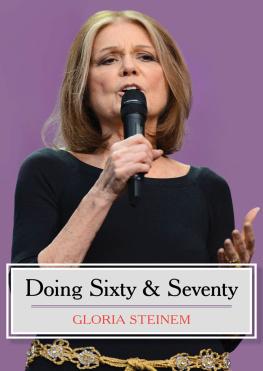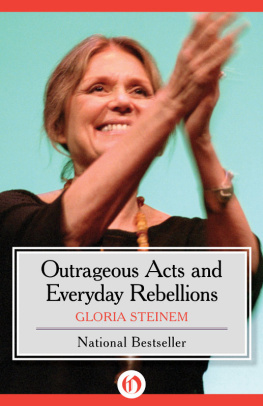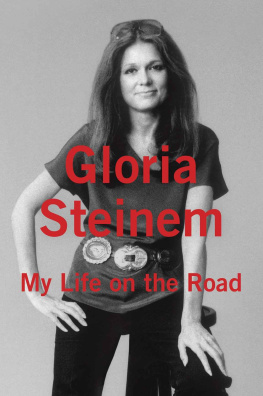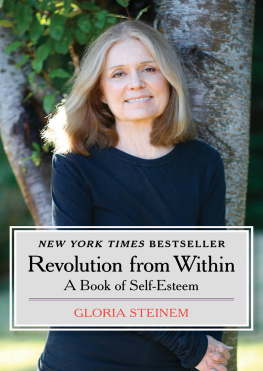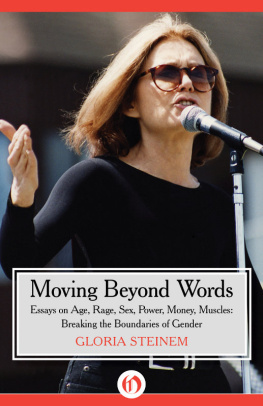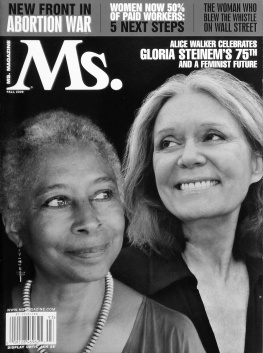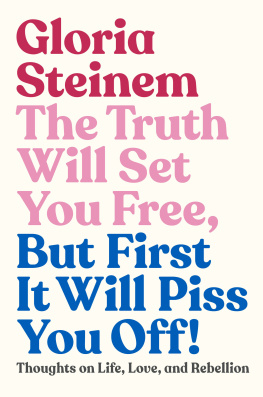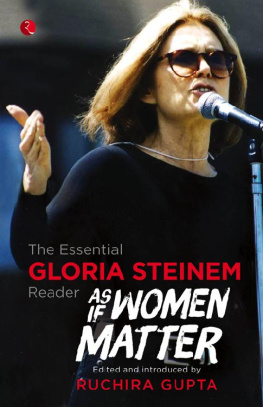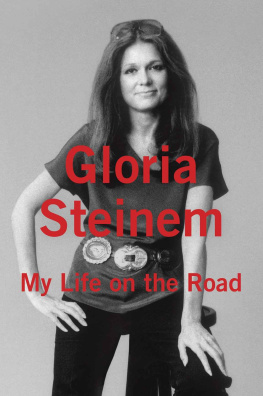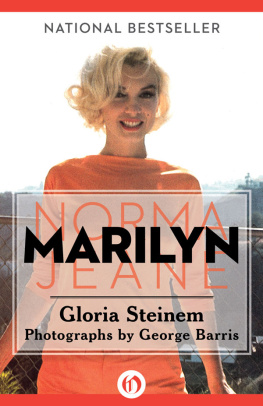Doing Sixty & Seventy
Gloria Steinem

Contents
Preface
Into the seventies
Updating Doing Sixty almost a dozen years later is a way of talking with a previous self. Though Ive had lessons since then in how utterly unpredictable life is, its also a chance to give a nudge to the future. Indeed, I wish Id taken stock this way at a younger agesort of a metaphysical version of cleaning for company, then wishing youd done it beforebut this feels especially crucial now that I know more everyday, yet come ever closer to the unknown.
Even mentioning the unknown is a change. Well into my fifties, I had ignored aging in a way that was great for activism. At sixty, I was thinking about aging and leaving the center of life. At just past seventy, Im conscious of the time I have before leaving it altogether; not at all the same thing. Even if I live to be a hundred, as I have every intention of doing, I will have less than thirty years to go: the same time I spent working on Ms. magazine, fewer years than Ive lived in my current apartment, and about the same time Ive been wearing my favorite pair of blue jeans.
To put this another way, aging feels like a process of the body, the concrete, the comparable, the mind. Making death real for even a millisecond feels like a mystery of the heart.
Im not presuming that my experience is the same as yours. Everything that makes us uniquebelief, culture, health, companionship, economics, hope, hereditycreates different paths on this universal journey. What I say here may be really helpful or really not. But I do have infinite faith in talking to each other. After all, we are communal creatures who must mirror each other to know who we are. Every living thing ages and dies, yet humans seem to be the only species that thinks about aging and thinks about dying. Surely, we are meant to use this ability, especially in a country that suffers so much from concealing aging and dying as if they were the last obscenities.
In retrospect, I realize that I, too, was in the Olympics of denial, yet some part of me needed to know the stages of life. Perhaps because I switched roles early and became the caretaker of my loving and sad mother, or because I didnt measure time by the usual periods of marriage, parenthood and the kind of career you retire from; perhaps because I didnt see a death early in my small family, or because I got so good at escaping into books and imaginary futuresfor all these reasons, the central years of adulthood seemed as if they could stretch on forever. If I was old when I was young, and, according to work and lifestyle, young when I was old, how relevant could aging be?
If I couldnt get to aging, I certainly couldnt get to death. I used to joke that I thought I was immortal and this caused me to plan poorly. Of course, part of me knew this was no joke. Now that distance allows me to see patterns, I notice that Ive always been trying to figure out these secrets.
At twenty-five or so when I came to New York to be a writer, I fell in love with Muriel Sparks Memento Mori, a little gem of a novel about a group of friends in London who are all connected by careers, marriages and affairs. Because they are now over seventy, gossip that once focused on work or sex has centered on who is losing which faculty. Each person has specific fears about aging and death, so we watch as each fearful imagining comes true.
I bought copies to give to my friends because I knew we had something to learn here. The message begins when a threatening phone caller announces to one character at a time, Remember, you must die. Most of the friends respond with fear, outrage, even calls to Scotland Yard, but there are two exceptions. A woman novelist, disdained by the group because she is barely able to remember if she had her tea, yet envied because her writing is being rediscovered by a new generation of readers, infuriates her friends even more by insisting that her caller was, a very civil young man. For the first time, we realize the various voices were each friends personification of Death.
Then there is a retired inspector, asked by his friends to help find this caller or group of callers, who delivers the message: If I had my life over again, I should form the habit of nightly composing myself to thoughts of death. I would practice, as it were, the remembrance of death. There is no other practice which so intensifies life. Death, when it approaches, ought not to take one by surprise. It should be part of the full expectation of life. Without an ever-present sense of death, life is insipid. You might as well live on the whites of eggs.
I wanted to be exactly like the inspector or the novelist.
Before I was thirty, I was proposing The Old Lady Book, a collection of interviews with elderly women who seemed to know this secret of intensified life. You wont be surprised to learn that old ladies werent considered commercial in the publishing world. Then I wrote an outline for The Death Book, an anthology of famous and not-so-famous last words and death scenes of men and women, real and fictional, sudden and lingering, from newspapers, novels, history, art and the comics. The idea was that, by the time the readers and I got to the end, we would be purged of denial, and able to see death as a social event. Needless to say, this was even less saleable.
No editor asked menor did I ask myselfwhy I was so interested in the end of life when I was so near its beginning. I didnt understand that we write what we need to know.
But there were other clues. For instance: I found old people more touching than children, an oddity in my generation when all women were supposed to be magnetized by all children. I was partly seeing the lost talents of my mother when I looked at aging female bodies and imagined the dreams locked up inside, but I also found elderly men poignant. Writing first-person short stories, for example, I made myself first an aging waiter, then an elderly subway guard. Im sure that pretending to be a male observer was a way of avoiding my vulnerability as a female participant, but I was also trying to understand the perspective of age. I sensed that I would be profligate with time until I admitted it had an endnot just for other people, but for me, too.
Nonetheless, in my heart, I didnt believe it for a minute. Life stretched before me without end. I lived in the future. I wasted time.
Change seems recognizable only after its happened, like putting ones foot down for a familiar stairand its not there. This was my state of mind in Doing Sixty. I was off-balance but, as youll see, also free and on a level at last. The stair of the feminine role was gone. So was the idea that I had to be chosen instead of making choices. It had taken a lot of living, plus time to metabolize that living, plus seeking out role models of great old women, plus realizing that my body knew how to age even if I didnt, to realize that the endless central years of life were over. A whole new and unimagined country lay beyond.
I dont know if the inspector and the novelist could have learned their wisdom earlier. Re-reading, I note that he said, If I had my life over. But for me, it was only after Id become an old lady myself that I lost the habit of imposing my sentimental interpretation on old people. Only after I knew I neednt have children myself could I see them as short people and potential friends. Only after Id connected with both ends of the spectrum did I understand why, as Native American and other ancient cultures tell us, the very young and the very old have more in common with each other than with people in the central years. Both are closer to the mystery.

